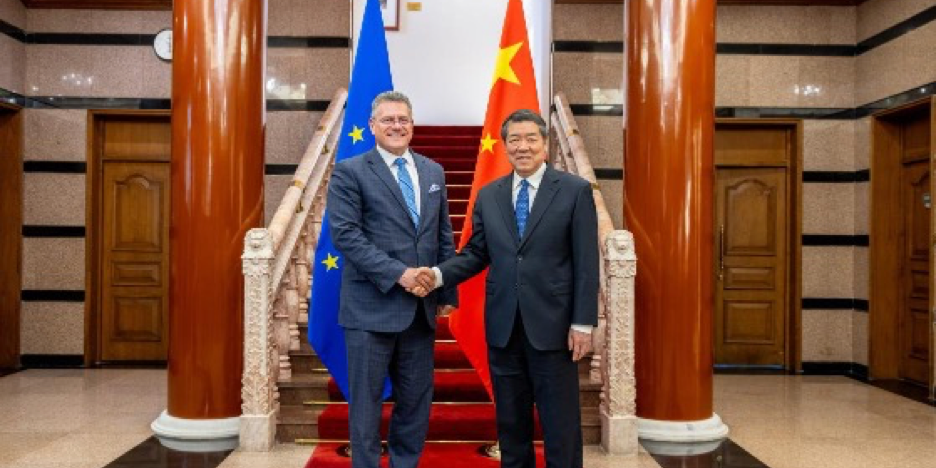CHINA and the European Union (EU) have held in-depth discussions on trade and investment matters and agreed to establish regular ministerial-level communications and enhance exchanges on major China-Europe economic and trade issues ahead of the United States announcement of a sweeping ‘reciprocal’ tariff policy.
The discussions held between China’s Commerce Minister Wang Wentao and visiting European Trade and Economic Security Commissioner Marcos Sefcovic five days ahead of the United States President Donald Trump’s announcement of the ‘reciprocal’ tariff policy, a policy direction which the World Trade Organisation (WTO) Director General Ngozi Okonjo-Iweala said has fuelled the decline in global trade and the potential for an excalating tarriff war.
US President Donald Trump has declared a ‘national emergency’ and announced a sweeping ‘reciprocal’ tariff on Thursday 3 April, setting a baseline tariff of 10 per-cent on all imported goods, but with higher tariffs on many countries as reported by the US media.
Okonjo-Iweala, in a statement, expressed concern that the US tariff measures will have substantial implications for global trade and economic growth prospects.
A senior research fellow at the Chongyang Institute for Financial Studies at the Renmin University of China, Dong Shaopeng told the Global Times that the sweeping tariff hikes have seriously disrupted the global trade system and left the WTO effectively paralysed.
Dong added that the US’s arbitrary tariff moves have raised the cost of imported goods to the US, stiffling production and distribution, whilst pushing inflation higher.
He said the global economic slow down demands international cooperation, adding that the US tariff hikes hurt its trading partners and will ultimately undermine its own economy.
From Trump’s perspective, the tariff hikes are designed to make the US stock market ‘boom’ but in reality, they may only accelerate the decline of the US economy, Dong said.
Dong said it will take time for the US to establish its internal manufacturing and supply systems, whilst some production capacity outside the country (US) has been forced to shut down due to the new tariff policy.
China and EU have agreed to promptly restart proposed price commitment talks regarding EU’s anti-subsidy case involving Chinese Electric Vehicles (EVs) and create favourable conditions for enhanced
investment and industrial cooperation between Chinese and European companies, China’s Ministry of Commerce (MOFCOM) spokesman He Yadong said at a regular press conference on Thursday 3 April.
He said China’s Commerce Minister Wang Wentao met with visiting European Trade and Economic Security Commissioner Marcos Sefcovic on March 28 when both sides had frank, in-depth and pragmatic discussions on China-EU economic relations and mutual trade concerns and reached several important consensus points.
Both sides recognise that the current international situation remains complex and volatile and agreed to uphold the independence and stability of China-EU economic relations, leveraging the 50th anniversary of diplomatic ties as an opportunity to enhance dialogue, deepen practical cooperation and jointly safeguard the multilateral trading system and global supply chains and thereby inject greater certainty and positive momentum into the world economy.
The MOFCOM spokesman said the two sides agreed to establish regular ministerial-level communications and enhance exchanges on major China-Europe economic and trade issues and also appointed designated contacts and directed their working teams to routinely assess bilateral trade concerns, advance ongoing progress and prepare for the next phase of high-level engagements.
He Yadong said during the discussions, both sides addressed key trade disputes, including the EU’s anti-subsidy investigation into Chinese EVs and China’s anti-dumping probe into EU brandy exports, and have reaffirmed their commitment to resolving these economic and trade differences through dialogue and consultation.
On the EU anti-subsidy case involving Chinese EVs, He said the two sides reached a consensus to restart proposed price commitment talks aimed at fostering a favourable environment for enhanced investment and industrial collaboration between Chinese and European firms.
Given the cases complexity and at the EU’s request, China has decided to lawfully extend the investigation period for the brandy anti-dumping case, He Yadong said.
The MOFCOM spokesman said both sides also discussed other key issues, including the EU’s foreign subsidy investigations, cosmetic regulations, agricultural and food product market access and government procurement policies and have reiterated their commitment to maintaining mutual market openness and ensuring a fair competititive environment for corporate cooperation.
By DELI-SHARON OSO
In Beijing, China
Photo caption: European Trade and Economic Security Commissioner Marcos Sefcovic and China’s Commerce Minister Wang Wentao in China. Photo by EU









